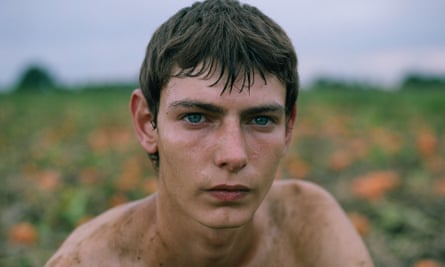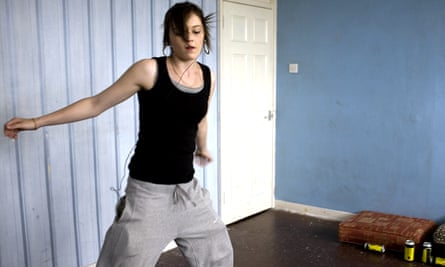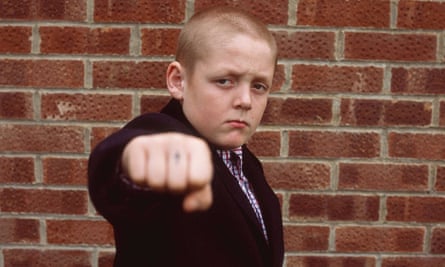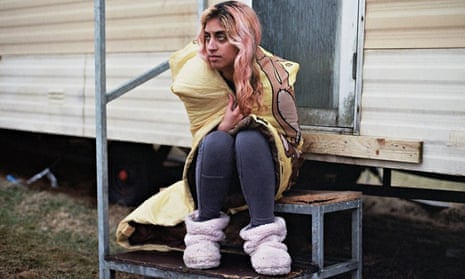Eddie Redmayne’s Oscar last week was the icing on the cake for what’s been a good spell for British acting. There was also recognition for the likes of Benedict Cumberbatch, Felicity Jones, Keira Knightley and Rosamund Pike at this year’s Oscars, and British actors have been routinely nabbing iconic American roles such as Martin Luther King (David Oyelowo), Solomon Northrup (Chiwetel Ejiofor) and even Abraham Lincoln (Daniel Day-Lewis). Not to mention Spider-Man, Superman and the last Batman.
But it’s a certain kind of British actor who has been celebrated of late, as evidenced by Vanity Fair’s recent Hollywood issue, which has a feature on “The new British invasion!” Here’s Jude Law sipping champagne while being measured for his Savile Row suit. Cumberbatch is taking his hound for a walk through the fog, Sam Claflin punts Sophie Turner down the Thames, Judi Dench is having tea at the Ritz. By and large, they’re posing inside swanky London restaurants or outside National Trust properties, all dressed like debutantes and old Etonians. It looks like a theme-park version of Toff England, which, when it comes down it, is all Hollywood is really interested in about Britain.
Along with this certain kind of actor, we’ve been getting a certain kind of movie: the kind that revolves around members of the royal family, Oxbridge graduates and world wars. British cinema is in a chicken-and-egg situation. Not to say Redmayne and company don’t fully deserve the acclaim, but the chorus of complaints about lack of opportunities for less-well-off actors keeps getting louder. “It’s only the posh ones who can afford to go into acting,” writer Jimmy McGovern told the Radio Times this week, suggesting that the lack of working-class actors was “affecting the kind of British drama that gets made”.
It’s something of a relief, therefore, to see a movie with a British-Pakistani girl with pink hair and a Yorkshire accent ordering a space-dust-and-marshmallow milkshake from a teenage shopkeeper who appears to be merrily off his head. That’s pretty much everything Vanity Fair wasn’t looking for in one scene. The film is Catch Me Daddy, a “northern western” made by newcomer director Daniel Wolfe. Over the course of one night, the story traverses the Yorkshire landscape following Laila (the British-Pakistani girl) and her white boyfriend on the run from bounty hunters despatched by Laila’s father. We visit caravan parks, run-down town centres, shabby cafes, nightclubs, taxi ranks, bus stops and, yes, makeshift milkshake bars, not to mention the wild, open moors. It’s the Britain we rarely see on our screens, which happens to be the one most of us live in.
It is in keeping with Catch Me Daddy’s setting that its cast is mostly made up of non-actors. There are professionals in the film, including Gary Lewis (best known as the dad in Billy Elliot) and Wasim Zakir (last seen in Chris Morris’s Four Lions), but most of the characters were found on the street. Barry Nunney, who plays the meanest of the bounty hunters, was discovered working in a scrapyard, and had served prison time for assault with a samurai sword. Sameena Jabeen Ahmed, who plays Laila, is a youth sports coach in Manchester by day. She was spotted walking home from work one evening by a casting agent, who had to explain that it wasn’t a hidden-camera show and that they really did want to put her in a movie.
The traditional channels were never going to work with a role such as Laila, Wolfe says. “Our casting director told us, you can pretty much see most of the British-Pakistani female actors of the right age in one afternoon. But no one was really right.” It took eight months to get the cast together, via a network of scouts and agents across the north-west of England. “We’d go to youth centres, shopping centres, bars. It got to the point where we were tapping people on the shoulder and they’d say, ‘you already approached me last week’.”

Wolfe, from Manchester, cut his teeth in commercials and music video, and even then, he cast from the street whenever possible. He says he often rejected the photogenic models his beer or mobile phone clients had wanted and went out to find people himself. It makes for a different type of film, he says: “You learn the patois, the vernacular of a place, so you get something authentic. Whereas an actor might just think, ‘You’re the director. You’ve given me these lines,’ any one of our cast members would say, ‘Shut up, I’m not saying that! You got that all wrong.’ And we’d go, ‘Oh, OK, what’s right?’ Good stuff comes of that. So it’s collaborative in a really exciting way.”
Catch Me Daddy is full of unplanned, often bizarre details as a result. The non-actors ad-libbed, augmented the script and threw in details from their lives. There are striking locations and memorable extras, such as a Pakistani falconer (who they spotted driving around one day), or the off-his-face milkshake mixer (who wasn’t actually off his face). It’s a rougher, less polished film as a result, but one that’s closer to the messy randomness of reality, and Ahmed stands out as a real discovery, running the gamut from carefree childishness to devastation.

The use of non-actors is not new, but given the current climate, street-casting could be a valuable mechanism for correcting our thespian imbalance. Wolfe cites Pier Paolo Pasolini and France’s Bruno Dumont as precedents (Dumont’s 1999 film L’Humanité scandalously won both best actor and actress awards at Cannes, with two non-professional leads), but Catch Me Daddy also fits into a distinguished lineage of street-cast British cinema. Laila’s boyfriend is played by Conor McCarron, who was first discovered by Peter Mullan in his street-cast 2010 youth drama Neds. Nunney was noticed during the casting search for another film: Clio Barnard’s The Selfish Giant. Other directors in this tradition include Shane Meadows, Penny Woolcock, Lynne Ramsay, Duane Hopkins, Joe Lawlor and Christine Molloy, and Andrea Arnold, who cast Katie Jarvis in Fish Tank after she was spotted arguing at a train station in Essex. And the grandaddy of the scene must be Ken Loach. “With non-actors you rely on their instinct,” Loach once said. “Often it’s things like the texture of their skin or the way they use language, things that they are not self-conscious about … all these things they don’t know they have.”
If the list reads like a roll-call of the most relevant British film-makers of the 21st century, it’s surely not a coincidence. You could say these movies are of a certain type: often set in northern England or Scotland, they often deal with young people, and poor, marginalised communities. They’re also often made with state support. It’s a movement often lazily labelled as social realism, but that’s not necessarily accurate. They’re attuned to British landscapes, internal as well as external, and the forces that shape them, but apt to express them lyrically and impressionistically rather than with documentary-like fidelity.
There’s more of it to come, including Guy Myhill’s debut The Goob, a Dumont-style youth drama set in working-class rural Norfolk. Its lead is another fresh, local face: Liam Walpole. Casting agent Leanne Flinn tells me she literally bumped into Walpole while they were both on their mobile phones crossing a road. He was an unemployed teenager who’d worked at the local chicken factory.

Should Eddie Redmayne be watching his back? All this might suggest that drama school is for well-heeled suckers. Those non-professionals who are inspired to pursue an acting career often struggle, though. It’s one thing to be cast to as a character who’s pretty much like yourself, quite another to be one more face in the casting directories, going through auditions, competing against better-trained rivals, being scrutinised out of context. Nunney, Catch Me Daddy’s bounty hunter, was recently rejected at a casting, Wolfe tells me, for “not looking scary enough”.
But careers have always been made this way, when we consider traditionally untrained British icons such as Michael Caine or Sean Connery. Shane Meadows’ finds have included Thomas Turgoose, child star of This Is England, and Paddy Considine, who had never acted before Meadows cast him. Loach has launched the career of many a non-professional: David Bradley in Kes, Crissy Rock in Ladybird, Ladybird, Martin Compston in Sweet Sixteen, and most recently Paul Brannigan, a Glaswegian recovering addict whom Loach cast in The Angels’ Share. The Goob’s Walpole went back to work at the chicken factory after the shoot finished, but has been noticed by modelling companies and is now on the catwalk for Yves Saint Laurent.
As for Sameena Jabeen Ahmed, she has won a few best newcomer awards for Catch Me Daddy, and she has been talking to agents but isn’t sure whether to pursue an acting career. Ironically, Wolfe says, he knew Ahmed was right for the part when she broke down in tears at her second audition. “She said she’d had a dream that she didn’t make the casting, and that she’d always wanted to act at school but she felt like it was not something she could do, or it just wasn’t encouraged.” There are doubtless many unknowns out there who feel just like her. They could be the future stars of British cinema, and even Vanity Fair (which would at least make for a more interesting photoshoot), but only if they’re given the opportunity.

Comments (…)
Sign in or create your Guardian account to join the discussion